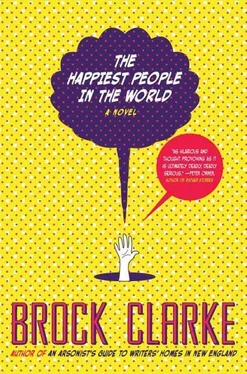“I see,” Henrik said but the man must have thought he didn’t, because he elaborated: “It’s Stevie Ray Vaughan’s birthday!” And then he raised his imaginary guitar to his mouth, where he appeared to eat it.
“I see,” Henrik said again. Because he did. He knew exactly what musician the man was talking about. He had heard this Stevie’s songs played on the radio in Denmark, had seen him on TV. Henrik had read all about him in newspapers and magazines. Henrik knew Standard English from school, but he knew America from everywhere else. This was his first time in America — not because he’d never had the chance, and not because he’d never wanted to go, but because he never thought he’d needed to, because America was always coming to him, the way it always comes to you, whoever you are.
Meanwhile the man had stopped gnawing on his imaginary guitar and was looking at Henrik, eyes wide, possibly in expectation, possibly in fear, possibly both, waiting, wondering, possibly wondering the same thing Henrik was wondering about him, and about himself. Wondering, What kind of man is this? Friend or foe? Wondering, Is this a man I should trust or a man I should run away from? Wondering, Are you scared like me? Why do you wear your hood that way, half on, half off? Are you in hiding? Do you not want to hide anymore? Have you been alone for so long? Are you so lonely? Do you have anyone to talk to? Do you have anyone to sing with?
And that’s why Henrik started singing. He sang, of course, one of this Stevie’s songs, one of his most popular songs, a duet. “Ebony and Ivory live together in perfect harmony,” Henrik began, eyes closed, singing both parts, but softly, embarrassed, because it was his first time singing to a stranger, on a bus, in America. Then he opened his eyes and saw the man looking at him, his eyes darting back and forth like little nervous pale blue bugs between Henrik and the rest of the bus. Henrik stood up slightly and looked over his seat toward the front; there were only a few other passengers on the bus, but their heads were turned in his direction, their faces pinched, wary, and Henrik remembered another thing Locs had told him: Never call attention to yourself. I’ve made a terrible, terrible mistake, he thought. This wasn’t the first time he’d had that thought, but every time felt like it would be the last. But when Henrik looked back at the man across the aisle, his eyes were smiling. His mouth, too. He nodded, Go on, and so Henrik sang another line, and when he did, something incredible happened. The man pushed the hood off the back of his head, and then his headphones, which landed in the hood, so naturally that it made Henrik wonder if that’s where he stored them when they weren’t over his ears. Then the man scooted over to the seat next to the aisle, closer to where Henrik was sitting. Henrik had read and heard but never really understood that English word— scooted —and why it was preferable to, for instance, the word moved until he saw the man do it on his bus seat. He did not move; he definitely scooted . Henrik scooted closer to him, too. Then the man sang the next line. He sang the line after that, and then the next one after that, too, which was Ebony’s. He seemed like he wanted to be Ebony, and Henrik let him. Individually, they sang loudly; together, they sang sweetly. When the song ended, they sang it again. Whenever they sang the chorus, the man grinned, reached over the aisle, and with his fist began walloping Henrik on the thigh, hard, not out of menace, but out of joy, joy, joy. Henrik knew he’d have bruises, but he didn’t care. He did not care. Everything is going to be just fine, he thought, and he might have gone ahead and said it out loud if he hadn’t already been singing. Henrik thought this because he felt safe; he felt like he belonged. Henrik felt like he’d come to the right bus, the right place, the right country. He felt, if his time on the bus was any evidence, like nothing and no one in America would ever hurt him, except possibly by accident or overenthusiasm.
Anyway, they sang the song again, and again, six times at least. They might still be singing it if the bus driver hadn’t yelled, in the way of all bus drivers — fingerless gloved hands on the wheel, his eyes finding theirs in the large rearview mirror—“Quit it or you’re walking!” In telling them to quit, the bus driver also called them by their last names. Not their real last names, of course, but the last names of the men who’d made the song famous, including the last name of the Stevie whose birthday it was. Henrik knew the bus driver wasn’t comparing them favorably to the original singers, of course; Henrik knew the driver was being sarcastic. But that felt fine, too. It doesn’t hurt to be insulted if you’re not the only one being insulted. It felt safer to be insulted with a friend than to be kept safe by a safe-keeper. This was one of the things Henrik was learning, on his own, unguarded, on the bus, on the way to Broomeville. He looked away from the bus driver and back to his new friend. Except now the friend’s smile was gone, his eyes were sad, subdued, his headphones over his ears, his hood half back on his head. And only then did Henrik truly hear one of the last names the bus driver had called them. It wasn’t the last name of the Stevie whose birthday it was. Or was it? Had Henrik heard the bus driver correctly? Please tell me I’m wrong, he asked his friend with his eyes. Please tell me everything is going to be just fine. Please tell me we’re talking about the same Stevie.
“No, you’re talking about Stevie Wonder,” the man said, and then he reached across the aisle and gently patted Henrik’s left forearm. “But he’s also quite a talent.”
AFTER ANOTHER HOUR OR SO, the bus exited the highway and entered another highway. The bus began to labor as the road went up and up and up. The air in the bus changed, even though the windows were closed. It felt colder, and cleaner. The man across the aisle retreated even more completely into his sweatshirt. Henrik buttoned his coat and looked out the window. It was a world of trees. Tall trees with unreal red and yellow leaves. Taller trees thick with deep green needles. Even the road was full of wood. Trucks hauling logs roared past the bus. Henrik couldn’t believe how fast they were going, especially since the logs were restrained by straps that looked just about thick enough to control a good-size mental patient and not several thousand pounds of lumber. The straps made Henrik nervous. Otherwise he felt good, and new inside. The bus passed a series of billboards. One said WELCOME WOODSMENS!!! Another said CLAMZ THURZDAY. The billboards made Henrik feel even better, like anything was possible, even new ways of spelling old words.
Then the bus took a left, off the divided highway. It bumped and rattled over some train tracks. The road narrowed. On the right was thick brush and piles of discarded railroad ties. On the left was a succession of three-story wooden houses, each with chipping gray paint and rusted metal balconies on the upper levels. The balconies leaned dangerously over the road, and children leaned dangerously over the balcony railings. The road narrowed some more, until it looked more like a chute than a road. It was very dark, but there was definitely light in front of them. It was like the bus was being born. Henrik imagined a cartoon in which a tiny bus covered in oil emerged from between the back wheels of a reclining larger bus. Maybe he would draw that cartoon once he got settled in Broomeville. But then again, maybe not. It might seem gross, even offensive, if you looked at it in a certain way. Henrik could imagine his wife looking at it in that certain way. Henrik could imagine the person who’d tried to kill him looking at it in a certain way, too. How would Broomeville look at it? Would Broomeville see things the way he did, or the way his wife did, or his would-be assassin?
Читать дальше












